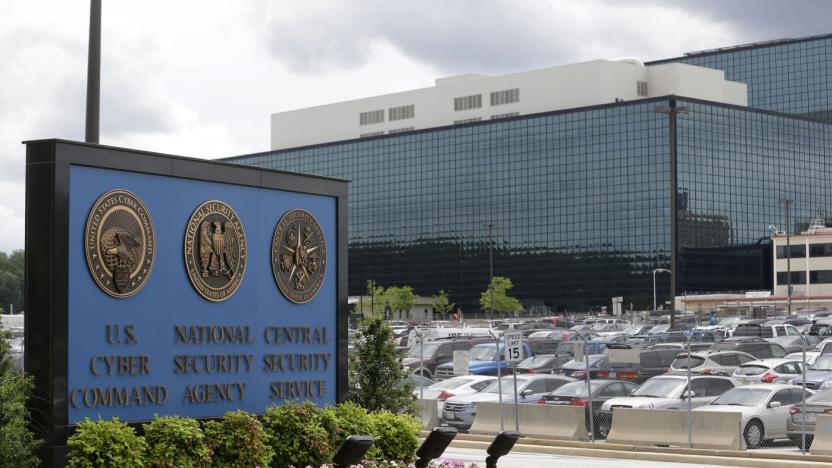patriotact
Latest

What's coming to Netflix in November: 'The Irishman' and 'Queer Eye'
November is a colossal month in the streaming ecosystem, with heavyweight newcomers Apple TV+ and Disney+ both making their debuts. Netflix doesn't plan to go quietly into the night though, as it has plenty of major titles coming to its platform over the month. Most notably, Martin Scorcese's latest mob epic The Irishman will hit Netflix November 27th -- just in time for Thanksgiving weekend. Also on the docket are The King, starring Timothée Chalamet (November 1st), and season two of The End of the F***ing World (November 5th).

Netflix puts a 'Patriot Act' episode about bad internet access on DVD
The latest episode of Netflix variety talk show Patriot Act with Hasan Minhaj focuses on the digital divide. In it, Minhaj breaks down some of the many reasons why internet access is so terrible across much of the US, including the roles of carriers and the Federal Communications Commission.

What’s coming to Netflix in February: ‘Patriot Act' and 'Jaws’
February is right around the corner, which means we'll all be spending a lot of time inside. It is the coldest month of the year, after all. So why not stave off cabin fever with Netflix's incoming lineup of originals and licensed classics? The streaming platform is bringing back comedian Hasan Minhaj's weekly show Patriot Act for another run, and you'll be able to catch new episodes every Sunday starting February 10th. Netflix is also debuting the first run of its new series Russian Doll, in which a woman gets caught in a Groundhog Day-like loop that forces her to relive her 36th birthday party over and over again. It drops February 1st.

What's coming to Netflix in October: 'Bodyguard' and 'Daredevil'
October was always going to be a packed month for new shows and movies on Netflix, with a litany of horror titles, and returns for Daredevil and Making a Murderer. Among the other Netflix original shows you'll be able to check out are BBC smash hit Bodyguard (October 24th), Patriot Act with Hasan Minhaj (weekly episodes start October 28th), drag queen reality series Dancing Queen and season two of Big Mouth (both October 5th).

The Feds are demanding that Google unlock phones as well
The American Civil Liberties Union (ACLU) compiled and released a map of where the federal government is currently taking Apple, Google -- and in some cases, both -- to court in order to compel the companies to unlock a suspect's phone. There are reportedly 70 cases in which federal prosecutors have invoked the All Writs Act, according to court records from October. The ACLU managed to turn up 63 of them -- nine of which targeted Google; the rest, Apple.

The NSA releases its first transparency report under the US Freedom Act
Back in June, President Obama signed the USA Freedom Act into law. The bill finally put limitations on the NSA's ability to bulk collect telephone data under the controversial section 215 of the Patriot Act. As part of the new bill, the NSA was compelled to release a transparency report detailing if it was meeting the privacy standards enacted by the Freedom Act. Today, the agency has published its first report, conducted by the NSA's Civil Liberties and Privacy Office (CLPO).

Jeb Bush would try to kill net neutrality if elected president
We already know presidential hopeful Jeb Bush thinks that net neutrality rules are the "craziest ideas," but should he make it to the Oval Office he wants to take that disdain one step further. Once he's holed up at 1600 Pennsylvania Avenue he'll make moves to eliminate the regulations keeping the internet equal for everyone, according to Bloomberg. Bush isn't straying too far from Republican party lines in that sense given that the GOP prides itself on the idea of smaller government, but considering that he wants to increase the amount of oversight and access the NSA has under the Patriot Act, his definition of "limited" seems pretty flexible.

The NSA can keep spying on phone call metadata through November
The National Security Agency can keep on keeping on with the bulk collection of phone call metadata for a bit longer, sadly. The United States Court of Appeals for the District of Columbia killed an injunction that would've ended the previously-ruled-unconstitutional homegrown spying, according to The New York Times. The law won't fully end until November 29th, when the so-called transition period for the agency to swap over to a new style of data collection is over. The latest method? Telcos will hang onto the data and the government snoops will need court orders if they want to get their hands on it. We still have a ways to go before PRISM's effects are fully overturned, it'd seem.[Image credit: Shutterstock]

Jeb Bush wants to expand the NSA's reach to fight 'evildoers'
Presidential hopeful Jeb Bush says that the government should be granted broad surveillance powers over both the American people and and private technology firms so that intelligence agencies can better fight "evildoers", according to the Associated Press. No, seriously, he specifically used the term "evildoers." Dick Dastardly, Skeletor, Gargamel had all better watch their backs if Jeb lands the Oval Office.

NSA won't look at call metadata collected under the Patriot Act
The National Security Agency is apparently willing to make a clean break from the past now that the USA Freedom Act is forcing it to scale back its large-scale surveillance efforts. The organization now says that it won't analyze call metadata collected under the Patriot Act from November 29th onward. It'll hang on to that data for another three months for "integrity purposes" (that is, verifying that new collection techniques are working) and as long as civil lawsuits require, but the goal is to destroy that info "as soon as possible." This doesn't put an end to mass surveillance (that's still practical under the new law), but it will prevent the NSA from digging through historical info that many critics believe it shouldn't have kept in the first place. [Image credit: AP Photo/Patrick Semansky]

Ex-attorney general says DOJ could negotiate with Snowden
Edward Snowden might be able to see his family in person again -- and (if things go his way) not from behind bars, either. According to former Attorney General Eric Holder, there's a "possibility" for the Department of Justice to negotiate an agreement with the whistleblower, which will allow him to come back home. One of Edward Snowden's lawyers admitted back in March that they were doing everything they could to bring him back to the US, so the two parties might have been talking for a while now. Holder didn't delve into specifics when asked if that meant the government is working on a plea deal, but he said: "I certainly think there could be a basis for a resolution that everybody could ultimately be satisfied with. I think the possibility exists."

The DEA's eavesdropping has tripled over the past decade
A federal agency eavesdropping is nothing new -- even if sometimes they do it with controversy. But, aside from the NSA, there's one in particular that has been quite active in the past few years: the Drug Enforcement Administration. According to records obtained by USA Today, thanks to the Freedom of Information Act, the DEA more than tripled its use of wiretaps (and other electronic tools used for snooping) over the last decade. As of last September, it had recorded 11,681 intercepts, compared to 3,394 made 10 years earlier. That's not the most interesting part about the report, however.

Senate passes USA Freedom Act (update: signed by Obama)
For the first time since the 9/11 attacks, both houses of Congress have agreed to limit the government's domestic surveillance powers. Earlier today, the Senate voted 67 to 32 and passed the USA Freedom Act, echoing the House's vote in May. The bill is designed to counter the Patriot Act's controversial section 215 -- the bit that enabled the NSA to collect phone records en masse, request "roving wiretaps" and seize business files -- just one day after the provision officially expired. Update: According to several press reports, tonight President Obama signed it into law.

US limits the NSA's reach ahead of sweeping reform
The Senate has voted overwhelmingly to reform the powers of America's security services, at the expense of renewing existing provisions of the Patriot Act. In a contentious debate leading up to midnight, the house belatedly opted to support the USA Freedom Act, which will eventually end the bulk collection of phone metadata. By opting not to extend the existing legislation, agencies such as the NSA and FBI will supposedly no longer have unfettered access to our phone records, be able to request "roving wiretaps" or seize business records for an investigation.

Senate blocks NSA reform bill and Patriot Act extensions
The USA Freedom Act aimed at addressing the NSA's bulk collecting of phone call metadata was approved by the House of Representatives ten days ago, but blocked by the Senate tonight (live video stream here). The Section 215 provisions of the Patriot Act used to enact the program are set to expire June 1st, and it could go away if a compromise isn't reached to extend it. Senator Rand Paul of Kentucky filibustered to push the vote to this late hour, while Sen. Mitch McConnell pushed for a series of extensions to the program, claiming the security of the country could be at risk. The Senate is taking a weeklong Memorial Day break, but will come back on May 31st for more discussion and probably more voting. The voting is done for tonight, but we expect much more discussion over the next week.

House approves NSA reform
The Republican-controlled House of Representatives passed the USA Freedom Act on Wednesday in a sweeping 338-88 vote, moving forward legislation that would curtail the NSA's bulk collection of data. The bill now moves to the Senate, which must approve it or find a compromise by June 1 -- this is when the provision of the Patriot Act that allows the NSA to collect metadata expires. The Senate is expected to vote by May 22. The White House supports the USA Freedom Act, though Senate Majority Leader Mitch McConnell (R-Ky.) opposes it and wishes to extend Section 215 of the Patriot Act, allowing the NSA to continue collecting bulk data. Google, Apple, Facebook, Microsoft, Twitter and other major tech companies have been campaigning in support of the USA Freedom Act as part of the Reform Government Surveillance coalition since late 2014. Early in May, a federal court ruled that the NSA's collection of metadata was illegal. Read all about Section 215 here. [Image credit: AFP/Getty Images]

Google executives talk Snowden and NSA backdoors during AMA
Senior members of Google's public policy team took to Reddit today to discuss the company's stance on government surveillance reform and the pending expiration of Section 215 of the Patriot Act that allows for the bulk collection of phone records. Google's director for law enforcement and information security, Richard Salgado and David Lieber, its senior privacy policy counsel took part in the discussion. Judging by the responses, the AMA didn't start as smoothly as they probably hoped. The very first answer about Google being hacked by individuals in China in 2009 seemed extremely canned and prompted the reply, "that is a non-answer. Did the PR team type it up for you?" After that, the answers got a bit more genuine.

Racing to June 1: The fight to control the Patriot Act
If Defcon is the cultural Comic-Con of security conferences, then RSA is more like the business-focused Game Developers Conference (GDC), though largely packed with government-corporate attendees. At the midpoint of a long day during last month's RSA San Francisco 2015, the largest security conference in the United States (with a record-breaking 33,000 in attendance), Congressman Mike Rogers took the stage to debate in favor of renewing the Patriot Act's Section 215, sometimes called the "library records" provision. "Renewing the Patriot Act" at RSA was about one of our nation's most pivotal public pain points in recent history -- Section 215′s facilitation of bulk telephone record collection. Despite the high-profile nature of this debate and its critical timing, it was a bizarrely toothless, kind of clueless, softball argument that somehow managed to completely avoid discussing why the renewal of this section of the Patriot Act, right now, is such a big deal.

The French Parliament approves controversial surveillance bill
In an attempt to prevent terrorist attacks, the French Parliament has approved a new surveillance law that gives unprecedented access to intelligence agencies. According to the BBC, the new bill was drafted three days after the Charlie Hebdo killings. While the government insists that the intelligence-gathering systems will monitor suspicious activities, defenders of civil liberties believe it allows the state to carry out mass surveillance without distinction. Despite the debate, the decision to pass the bill was almost unanimous. Both the ruling Socialists and opposition voted in favor of it.

The 'warrant canary' in Apple's compliance report
There was an interesting nugget we glanced over regarding Apple's report detailing its compliance with various government information requests. In the Notes section of the report, located at the very bottom, Apple writes: Apple has never received an order under Section 215 of the USA Patriot Act. We would expect to challenge such an order if served on us. So why is that so interesting? Well, if Apple had in fact received an order under Section 215 of the Patriot Act, it wouldn't be legally allowed to admit it. Consequently, if the aforementioned language is removed in future compliance reports from Apple, it would stand to reason that Apple had since received an order under the Patriot Act. And apparently, this clever little number is referred to as a warrant canary.














